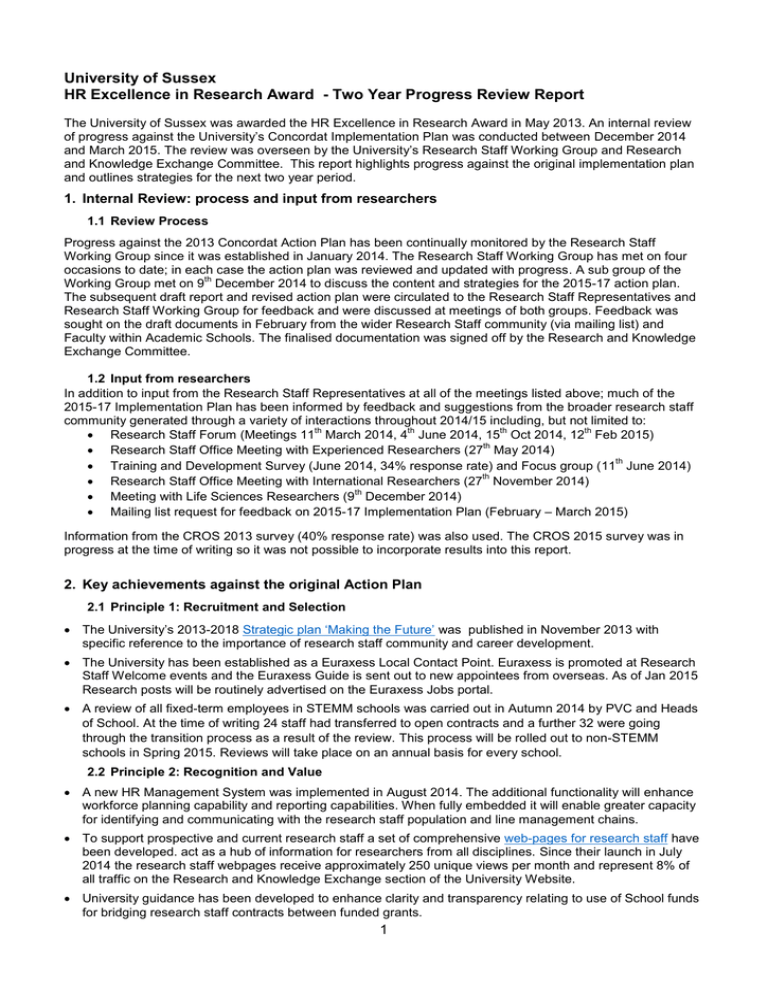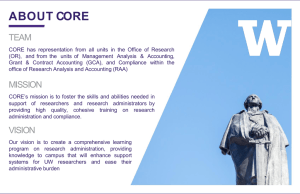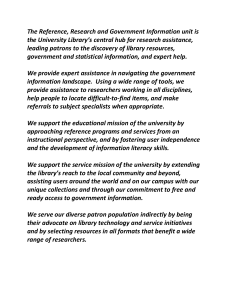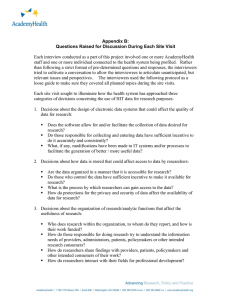Internal Review Report 2015
advertisement

University of Sussex HR Excellence in Research Award - Two Year Progress Review Report The University of Sussex was awarded the HR Excellence in Research Award in May 2013. An internal review of progress against the University’s Concordat Implementation Plan was conducted between December 2014 and March 2015. The review was overseen by the University’s Research Staff Working Group and Research and Knowledge Exchange Committee. This report highlights progress against the original implementation plan and outlines strategies for the next two year period. 1. Internal Review: process and input from researchers 1.1 Review Process Progress against the 2013 Concordat Action Plan has been continually monitored by the Research Staff Working Group since it was established in January 2014. The Research Staff Working Group has met on four occasions to date; in each case the action plan was reviewed and updated with progress. A sub group of the th Working Group met on 9 December 2014 to discuss the content and strategies for the 2015-17 action plan. The subsequent draft report and revised action plan were circulated to the Research Staff Representatives and Research Staff Working Group for feedback and were discussed at meetings of both groups. Feedback was sought on the draft documents in February from the wider Research Staff community (via mailing list) and Faculty within Academic Schools. The finalised documentation was signed off by the Research and Knowledge Exchange Committee. 1.2 Input from researchers In addition to input from the Research Staff Representatives at all of the meetings listed above; much of the 2015-17 Implementation Plan has been informed by feedback and suggestions from the broader research staff community generated through a variety of interactions throughout 2014/15 including, but not limited to: th th th th Research Staff Forum (Meetings 11 March 2014, 4 June 2014, 15 Oct 2014, 12 Feb 2015) th Research Staff Office Meeting with Experienced Researchers (27 May 2014) th Training and Development Survey (June 2014, 34% response rate) and Focus group (11 June 2014) th Research Staff Office Meeting with International Researchers (27 November 2014) th Meeting with Life Sciences Researchers (9 December 2014) Mailing list request for feedback on 2015-17 Implementation Plan (February – March 2015) Information from the CROS 2013 survey (40% response rate) was also used. The CROS 2015 survey was in progress at the time of writing so it was not possible to incorporate results into this report. 2. Key achievements against the original Action Plan 2.1 Principle 1: Recruitment and Selection The University’s 2013-2018 Strategic plan ‘Making the Future’ was published in November 2013 with specific reference to the importance of research staff community and career development. The University has been established as a Euraxess Local Contact Point. Euraxess is promoted at Research Staff Welcome events and the Euraxess Guide is sent out to new appointees from overseas. As of Jan 2015 Research posts will be routinely advertised on the Euraxess Jobs portal. A review of all fixed-term employees in STEMM schools was carried out in Autumn 2014 by PVC and Heads of School. At the time of writing 24 staff had transferred to open contracts and a further 32 were going through the transition process as a result of the review. This process will be rolled out to non-STEMM schools in Spring 2015. Reviews will take place on an annual basis for every school. 2.2 Principle 2: Recognition and Value A new HR Management System was implemented in August 2014. The additional functionality will enhance workforce planning capability and reporting capabilities. When fully embedded it will enable greater capacity for identifying and communicating with the research staff population and line management chains. To support prospective and current research staff a set of comprehensive web-pages for research staff have been developed. act as a hub of information for researchers from all disciplines. Since their launch in July 2014 the research staff webpages receive approximately 250 unique views per month and represent 8% of all traffic on the Research and Knowledge Exchange section of the University Website. University guidance has been developed to enhance clarity and transparency relating to use of School funds for bridging research staff contracts between funded grants. 1 The Sussex Research Staff Association has evolved into a group of 13 Research Staff Representatives drawn from across the University. Reps meet termly as a group with the Research Staff Office, are members of the University’s Research Staff Working Group and some reps contribute to School level committees. They have been instrumental in formulating the 2015-17 Concordat Implementation Plan. 2.3 Principles 3 and 4: Support and Career Development A research staff training and development review was conducted in June-August 2014. The review included a survey (34% participation) and focus group of research staff, feedback from Heads of Schools, review of current provision and benchmarking provision against other institutions. Outcomes of the review were communicated to the Research Staff Working Group (Oct 2014), Research and Knowledge Exchange Committee (Oct 2014), Heads of School, Directors of Research and Knowledge Exchange and published on the research staff website. In line with the outcomes of the review a new suite of training and development events and workshops tailored for research staff was launched for the 2014/15 academic year. At the time of writing 8 workshops had taken place and a further 10 are planned for the remainder of the academic year. A total of 85 different individuals had participated in one or more of the workshops held to date, representing approximately 26% of the total research staff population. Participants have been drawn from all 12 of the Academic Schools and feedback has been positive with 94% of participants that completed a workshop evaluation stating that they would recommend the workshop to other researchers. To support researchers joining the institution, a quarterly welcome event for new research staff has been initiated (from Oct 2014). The information provided through the event is supported by a welcome email sent to all new research staff and through the information provided on the research staff webpages. Research Staff Reps from Psychology have developed a research staff induction handbook for the School. Roll out of a similar handbook will be encouraged for all academic schools as part of the 2015-17 implementation plan. Focus groups have been held with specific groups of researchers during 2014 to more clearly understand how the University might better support their needs, including experienced research fellows and research staff that relocated to Sussex from overseas. Information from these meetings has been used to inform the 2015-17 Concordat implementation plan. 2.4 Principle 5: Researchers Responsibilities Through the Research Staff Representatives and the Research Staff Forum, researchers are encouraged to take a proactive interest in their own professional development and the support of colleagues. Research staff have raised issues and worked collaboratively with the Research Staff Office to initiate focus groups to look for solutions (e.g. support for international researchers) and some are involved in delivering development courses to other researchers (e.g. Public engagement, Aiming for a Lectureship). As well as their engagement at a university level, Research Staff Reps are also proactive within their own Schools/departments, for example improving school level induction (Psychology), setting up a group for women researchers (SPRU) and representing research staff at school committees. To assist researchers in managing their own career and professional development, information flows have been improved through the webpages, mailing list and Research Staff Forum to highlight development opportunities, policy developments, and information about the broader research and funding environment. 2.5 Principle 6: Diversity and Equality The University is sponsoring 4 Daphne Jackson Fellowships for returning researchers from STEM disciplines. The sponsored Fellows are expected to take up their positions from August 2015. A revised promotion procedure was implemented for the 2014/15 promotion round that takes into account special personal circumstances (e.g. maternity leave, health issues, caring responsibilities). Success rates of those declaring special circumstances were not available at the time of writing but will be monitored. In association with the University’s Athena SWAN agenda, a pilot mentoring circles scheme for women research staff from STEMM disciplines was initiated for the 2014/15 academic year. Four mentoring circles were formed representing a take up of 27% of female STEMM research staff. Groups meet regularly to discuss a variety of issues and challenges encountered by women at the early career stages of research. The University achieved an Institutional Athena SWAN Bronze Award in April 2013. To date 4 departments (Life Sciences, Physics, Engineering and Informatics, Brighton and Sussex Medical School) have achieved departmental Athena SWAN Bronze Awards and the remainder of the STEMM Schools/departments have submitted applications in April 2015. The school of Law and Political Sciences achieved a Bronze GEM award in April 2014 after participating in the Equality Challenge Unit’s pilot of the Gender Equality Charter Mark, which has been converted to Bronze Athena SWAN following recent expansion of the charter. 2 2.6 Principle 7: Review and Implementation The Research Staff Working Group, which is chaired by the Director of Research Staff Development was established in January 2014 and meets termly to review progress against the Concordat Implementation plan and advise on policies and initiatives to support research staff. Reports are provided termly to the Research and Knowledge Exchange Committee and HR committee. CROS 2013, the 2014 training and development review, Research Staff Representatives, Research Staff Forum and various researcher focus groups have been essential in providing feedback and input into the implementation of the current action plan and for planning the development of the 2015-17 plan. This approach will be continued for the 2015-17 implementation plan and extended to encourage greater input from PIs. 3. Strategies for 2015-2017 The University remains committed to supporting the professional development of its research staff and will continue to build and enhance initiatives to align policy and provision with the Concordat principles. The following strategies are underpinned by the new 2015-2017 University of Sussex Concordat Implementation Plan. (The Concordat principle(s) to which each strategy aligns is shown in brackets): 1) Adopt a longer term view of researcher progression and retention (Principle 1): Improving the clarity of research career pathways and regular contract reviews with transition to indefinite contracts wherever appropriate. Best practice in support for career progression will be shared and encouraged across the University, for example fellowship mentoring and accounting for promotion in research proposal budgets. 2) Improve mechanisms for recognising the achievements of our researchers (Principle 2): Public profiles will be refined to accurately reflect where a researcher holds an independent fellowship or is a Principle Investigator. New tailored appraisal documentation will enable productive research and career development discussions on a regular basis. Supervisory roles taken by research staff will be documented in University records. Case studies will celebrate the successes and achievements of Sussex researchers. 3) Provide enhanced support and guidance for research staff managers (Principles 3 & 4): Including developing the HR database to enable accurate identification of research staff line management chains to enhance communications capability. New webpages and guidance for research staff managers will provide information to support career management discussions and provide clarity about the level of professional development that is appropriate for researchers to undertake alongside other research duties. Faculty research staff champions will support managers and researchers in implementing Concordat principles. 4) Evaluate and build on existing professional development provision (Principles 3 & 4): Including widening mentoring circles schemes across the institution and evaluating and enhancing the training and development workshop programme for research staff. 5) Continue to improve support for researchers at both the beginning and end of research contracts (Principles 3, 4 and 5): Improving support and information offered to international researchers moving to Sussex and rolling out best practice in School level induction across the institution. Additional communications to researchers within 6 months of the end of their contracts will provide information, resources and support in making the next steps in their career. 6) Empower researchers to take an active role in shaping University policy and support for the research staff community (Principle 5): Through an expanded network of research staff representatives, Research Staff Forum and recognised membership of University and School level committees. 7) Support and encourage a diverse and flexible community of researchers (Principle 6): Providing opportunities to return to a research career following a break and publishing guidance for researchers and managers to support individuals prior to, during and following a period of maternity/parental leave. Regular monitoring of the researcher population with regards to diversity and flexible working. 8) Continue to evaluate and monitor strategy implementation and alignment with Concordat Principles (Principle 7): Through meetings of the Research Staff Working Group and Research Staff Reps and feedback from Research Staff Forum, focus groups and participation in local and national level surveys. Broad Success Measures: Detailed success measures are provided in the 2015-17 Implementation Plan. Broadly, Sussex will be looking for continued improvements in researchers’ satisfaction with respect to all concordat principles as measured by CROS and internal surveys/focus groups, increasing proportions of researchers on indefinite contracts, increased representation of research staff at School and University committees and improving engagement of PIs/Research managers with research staff development. 3



